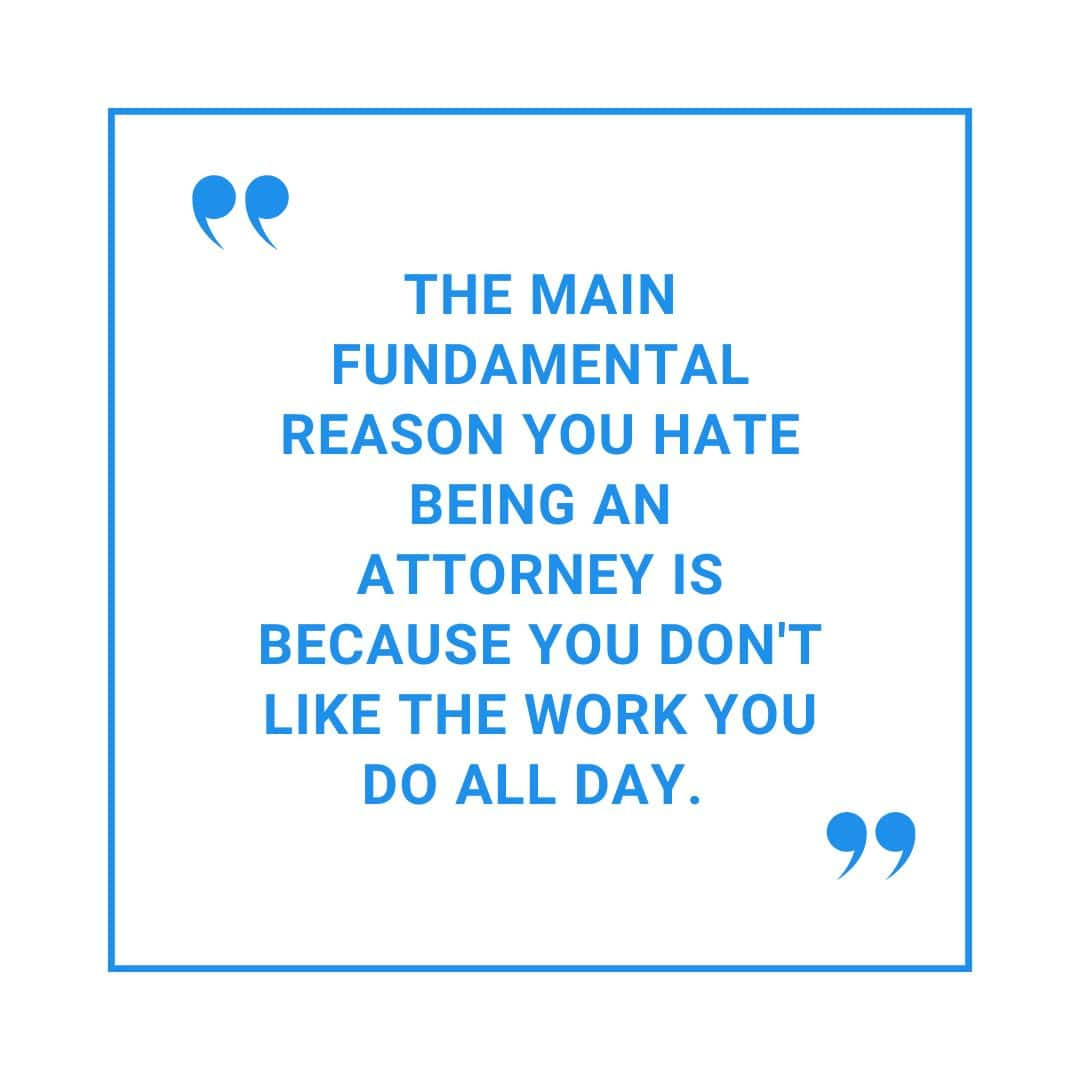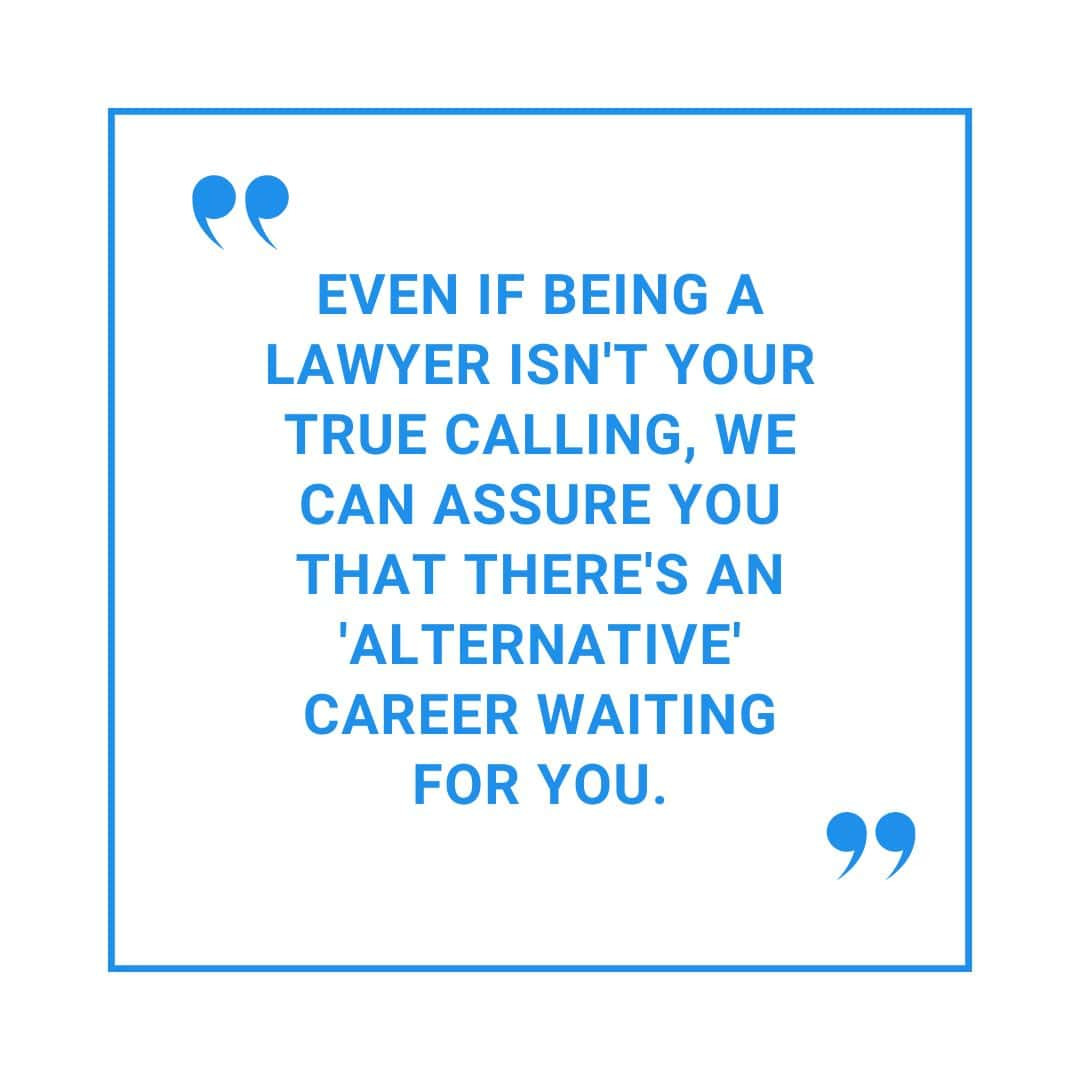Feeling disillusioned with your legal career? You’re definitely not alone. Many lawyers find themselves googling phrases like “being a lawyer sucks” or “hate being a lawyer,” searching for answers and validation. At internetlawyers.net, we understand these frustrations and offer resources to help you explore alternative career paths and reclaim your professional happiness. Discover fulfilling opportunities outside the legal field and unlock your potential for a more satisfying future by identifying and leveraging your unique talents.
1. What Makes Being a Lawyer So Unpleasant?
The legal profession, while often perceived as prestigious, can be surprisingly taxing. The reasons “being a lawyer sucks” are multifaceted, impacting both personal well-being and professional fulfillment. The core issues often stem from the realities of the job, differing sharply from the glamorous portrayals in media.
Common Complaints:
- Lack of Work-Life Balance: Long hours are standard, blurring the lines between professional and personal life. The American Bar Association (ABA) highlights the challenges of balancing work and personal commitments, contributing to lawyer burnout.
- High-Pressure Environment: The constant need to meet deadlines, manage demanding clients, and ensure meticulous accuracy leads to chronic stress. Studies from Yale Law School indicate that lawyers face significantly higher rates of depression and anxiety compared to other professions.
- Adversarial Nature: The combative atmosphere of legal proceedings can be emotionally draining, especially for those who prefer collaboration over confrontation.
- Administrative Overload: The daily reality for lawyers involves an array of routine and tedious tasks. Document review, drafting motions, writing briefs, taking client calls, conducting legal research, and preparing for depositions can become monotonous and unfulfilling over time.
- Limited Creativity: Much of legal work involves repetitive tasks and adherence to established procedures, leaving little room for creative problem-solving.
- Ethical Dilemmas: Navigating complex ethical considerations can be morally challenging and emotionally taxing. The ABA provides resources on legal ethics to assist lawyers in upholding professional standards.
- High Expectations: Lawyers often face intense scrutiny and pressure to perform flawlessly, leading to a fear of making mistakes.
- Financial Pressures: High student loan debt combined with the pressure to maintain a certain lifestyle can create significant financial stress.
- Lack of Appreciation: Many lawyers feel underappreciated by their firms, partners, or clients, leading to a sense of devaluation.
 Disappointed Lawyer
Disappointed Lawyer
2. Is the Core Issue Just Disliking the Work?
Yes, the fundamental reason for lawyer dissatisfaction often boils down to disliking the daily tasks and responsibilities. While external factors like long hours, demanding clients, and firm culture contribute to the problem, the true source of unhappiness lies in the nature of the work itself.
Why This Matters:
- Misalignment of Skills and Strengths: Many individuals enter law without a clear understanding of the day-to-day realities, leading to a mismatch between their natural talents and the demands of the profession.
- Lack of Creativity and Innovation: Legal work can be highly structured and detail-oriented, offering limited opportunities for creativity and innovation.
- Tedious and Repetitive Tasks: A significant portion of a lawyer’s time is spent on routine tasks like document review, legal research, and drafting routine correspondence, which can be monotonous and unfulfilling.
- Adversarial Nature: The combative environment of legal proceedings can be emotionally draining, especially for those who prefer collaboration over confrontation.
- Ethical Dilemmas: Navigating complex ethical considerations can be morally challenging and emotionally taxing.
Example:
Imagine a lawyer who thrives on creative problem-solving but finds themselves bogged down in endless document review. While they may initially attribute their unhappiness to long hours or difficult clients, the root cause is a misalignment between their strengths and the demands of their job. This disconnect can lead to feelings of frustration, boredom, and a general sense of dissatisfaction with their career.
3. What If I Don’t Fit the “Lawyer” Mold?
It’s perfectly acceptable if the adversarial, detail-oriented nature of law doesn’t align with your personality. Not everyone is cut out for the traditional legal path, and recognizing this is the first step toward finding a more fulfilling career.
Understanding Your Personality:
- Self-Reflection: Take time to identify your core values, interests, and strengths. What activities make you feel energized and engaged? What are you naturally good at?
- Personality Assessments: Consider taking personality assessments like the Myers-Briggs Type Indicator (MBTI) or the Enneagram to gain deeper insights into your personality traits and how they align with different career paths.
- Career Counseling: Consult with a career counselor who can help you explore alternative career options based on your personality and interests.
Embracing Your Strengths:
- Identify Transferable Skills: Recognize the skills you’ve developed as a lawyer that can be applied to other fields, such as critical thinking, problem-solving, communication, and negotiation.
- Explore Alternative Careers: Research different career paths that align with your personality and interests, such as mediation, consulting, entrepreneurship, or public policy.
- Networking: Connect with professionals in fields that interest you to learn more about their experiences and gain insights into potential career opportunities.
4. How Can I Deal With The Billable Hour Stress?
The pressure to meet billable hour requirements is a significant source of stress for many lawyers. This system often prioritizes quantity over quality and can lead to burnout and a poor work-life balance.
Strategies for Managing Billable Hour Stress:
- Time Management Techniques: Implement effective time management strategies, such as prioritizing tasks, setting realistic goals, and avoiding procrastination.
- Negotiate Workload: If possible, negotiate your workload with your firm to ensure it is manageable and sustainable.
- Seek Support: Talk to colleagues, mentors, or therapists about your stress and seek their advice and support.
- Set Boundaries: Establish clear boundaries between work and personal life to protect your time and energy.
- Consider Alternative Billing Arrangements: Explore alternative billing arrangements, such as value-based billing or fixed fees, which can reduce the pressure to bill hours.
Resources:
- American Bar Association (ABA): Offers resources on lawyer well-being and stress management.
- Lawyer Assistance Programs (LAPs): Provides confidential support and counseling services for lawyers struggling with stress, burnout, or mental health issues.
5. What If My Perfectionism Is Making Me Miserable?
The legal profession often demands a high level of precision and attention to detail, which can lead to perfectionism and a fear of making mistakes. This can create immense pressure and anxiety.
Strategies for Overcoming Perfectionism:
- Challenge Negative Thoughts: Identify and challenge negative thoughts and beliefs about perfectionism. Recognize that making mistakes is a normal part of learning and growth.
- Set Realistic Standards: Set realistic standards for yourself and avoid striving for unattainable levels of perfection.
- Practice Self-Compassion: Treat yourself with kindness and understanding when you make mistakes.
- Focus on Progress, Not Perfection: Focus on making progress rather than achieving perfection. Celebrate small victories and acknowledge your accomplishments.
- Seek Therapy: Consider seeking therapy to address underlying issues related to perfectionism and anxiety.
6. How Do I Deal With Hostile Personalities in the Legal Field?
Unfortunately, the legal profession can sometimes attract individuals with difficult or hostile personalities. Dealing with these individuals can be emotionally draining and create a toxic work environment.
Strategies for Dealing with Hostile Personalities:
- Set Boundaries: Establish clear boundaries and avoid engaging in unnecessary conflict.
- Document Interactions: Keep a record of all interactions with difficult individuals, including dates, times, and specific details.
- Seek Support: Talk to colleagues, mentors, or HR about your experiences and seek their advice and support.
- Focus on What You Can Control: Focus on controlling your own reactions and responses to difficult individuals.
- Consider Mediation: If possible, consider mediation to resolve conflicts and improve communication.
7. Is It Normal To Envy People Who Aren’t Lawyers?
Yes, it’s perfectly normal to feel envious of people in other professions, especially if you’re unhappy with your legal career. This envy can be a sign that you’re longing for something different and that it may be time to explore alternative career paths.
Addressing Envy:
- Identify the Source: Determine what aspects of other careers you envy. Is it the work-life balance, the creative opportunities, the sense of purpose, or something else?
- Research Alternative Careers: Research careers that offer the qualities you’re seeking. Talk to people in those fields to learn more about their experiences.
- Focus on Your Strengths: Recognize the skills and experiences you’ve gained as a lawyer that can be applied to other fields.
- Take Action: Take steps to explore alternative career paths, such as networking, taking courses, or volunteering.
8. What If I Just Want To Make More Money?
While money isn’t everything, it’s understandable to want a career that provides financial stability and security. If you’re unhappy with your current salary as a lawyer, there are several steps you can take to improve your earning potential.
Strategies for Increasing Your Income:
- Negotiate Salary: Research industry standards and negotiate your salary when accepting a new job or during annual reviews.
- Seek Advancement: Pursue opportunities for advancement within your firm or organization.
- Develop Specialized Skills: Develop specialized skills that are in high demand, such as intellectual property law, cybersecurity law, or data privacy law.
- Consider a Lateral Move: Consider moving to a different firm or organization that offers higher salaries.
- Explore Alternative Careers: Research alternative careers that offer higher earning potential, such as consulting, finance, or technology.
9. What If I Hate The Lack of Control Over My Life?
The demanding nature of the legal profession can often leave lawyers feeling like they have little control over their lives. Long hours, unpredictable schedules, and the need to constantly be available for clients can lead to burnout and a sense of being overwhelmed.
Regaining Control:
- Set Boundaries: Establish clear boundaries between work and personal life. Set specific hours for work and stick to them as much as possible.
- Delegate Tasks: Delegate tasks whenever possible to reduce your workload and free up time for other priorities.
- Prioritize Self-Care: Make time for activities that help you relax and recharge, such as exercise, meditation, or hobbies.
- Take Breaks: Take regular breaks throughout the day to avoid burnout and maintain focus.
- Seek Support: Talk to colleagues, mentors, or therapists about your stress and seek their advice and support.
 Lawyer on a Path
Lawyer on a Path
10. How Can I Transition to a “Recovering Lawyer?”
Transitioning to a new career path after investing years in law can seem daunting, but it’s entirely possible. The key is to approach the transition strategically and focus on leveraging your existing skills and experiences.
Steps to Becoming a “Recovering Lawyer”:
- Self-Assessment: Identify your core values, interests, and strengths. What are you passionate about? What are you naturally good at?
- Explore Alternative Careers: Research different career paths that align with your interests and values. Talk to people in those fields to learn more about their experiences.
- Identify Transferable Skills: Recognize the skills you’ve developed as a lawyer that can be applied to other fields, such as critical thinking, problem-solving, communication, and negotiation.
- Networking: Connect with professionals in fields that interest you to learn more about potential career opportunities.
- Education and Training: Consider pursuing additional education or training to enhance your skills and knowledge in your desired field.
- Resume and Cover Letter: Craft a resume and cover letter that highlight your transferable skills and experiences.
- Interview Preparation: Prepare for interviews by practicing your answers to common questions and researching the company and role.
11. How Do I Identify My Unique Genius?
Discovering your “Unique Genius” involves recognizing the skills and strengths that come naturally to you and align with alternative careers. This is crucial for finding a fulfilling non-law job.
Steps to Uncover Your Unique Genius:
- Self-Reflection: Take time to reflect on your past experiences and identify activities that made you feel energized, engaged, and successful.
- Seek Feedback: Ask friends, family, and colleagues for feedback on your strengths and talents. What do they see as your unique abilities?
- Identify Your Passions: What are you passionate about? What activities do you enjoy doing in your free time?
- Take Assessments: Consider taking assessments like the CliftonStrengths assessment or the VIA Character Strengths survey to gain deeper insights into your strengths and talents.
- Reflect on Your Values: What values are most important to you? What kind of work aligns with your values?
12. What Alternative Jobs Are Available?
Many alternative career paths leverage the skills and experiences gained in law, offering more fulfilling and balanced lifestyles.
Alternative Career Options for Lawyers:
| Career Path | Description | Skills Utilized |
|---|---|---|
| Compliance Officer | Ensures an organization adheres to laws and regulations. | Legal knowledge, analytical skills, attention to detail. |
| Mediator | Helps parties resolve disputes outside of court. | Negotiation skills, communication skills, conflict resolution. |
| Consultant | Provides expert advice to businesses in various areas, such as management, strategy, or operations. | Analytical skills, problem-solving skills, communication skills. |
| Entrepreneur | Starts and runs their own business. | Business acumen, leadership skills, problem-solving skills. |
| Public Policy Analyst | Researches and analyzes public policy issues and provides recommendations to policymakers. | Analytical skills, research skills, communication skills. |
| Legal Tech | Work with technological innovation in the legal field. | Legal Knowledge, technological skill, communication skills, project management. |
| Academia | Legal Researcher/Professor for Universities and Higher Learning Institutes. | Legal Expertise, teaching skills, communication skills. |
| HR professional | Human resources field with any company that requires HR knowledge. | Knowledge of workplace law, communication skills, people skills. |
| Project Manager | Oversee and manage projects from inception to completion. | Organizational Skills, budgeting, time-management, leadership, communication skills. |
| Journalist | Writing and communications expert. | Writing skills, communication skills, attention to detail. |
13. How Do I Create a Resume for a Non-Law Job?
Crafting a resume for a non-law job requires highlighting your transferable skills and framing your legal experience in a way that resonates with hiring managers in other industries.
Resume Tips for “Recovering Lawyers”:
- Focus on Transferable Skills: Emphasize skills like critical thinking, problem-solving, communication, negotiation, research, and project management.
- Quantify Achievements: Use numbers and data to quantify your accomplishments and demonstrate the impact of your work.
- Tailor to the Job: Customize your resume for each job you apply for, highlighting the skills and experiences that are most relevant to the specific role.
- Use Action Verbs: Use strong action verbs to describe your responsibilities and accomplishments.
- Keep it Concise: Aim for a one- or two-page resume that is easy to read and understand.
Example:
Instead of simply stating that you “managed a team of associate attorneys,” the resume would include a phrase like “managed a team of attorneys, resulting in a 30% increase in efficiency and a significant reduction in case processing time.”
14. How Do I Address Concerns About Leaving Law in an Interview?
Hiring managers may be curious about your decision to leave law. Be prepared to address their concerns with confidence and clarity.
Tips for Addressing Concerns:
- Be Honest and Authentic: Explain your reasons for leaving law in a clear and honest manner.
- Focus on the Positive: Emphasize the skills and experiences you’ve gained as a lawyer and how they will benefit you in your new role.
- Demonstrate Enthusiasm: Show enthusiasm for the new opportunity and demonstrate your commitment to success.
- Address Concerns Directly: Anticipate potential concerns and address them directly in your answers.
Example:
“While I enjoyed certain aspects of my legal career, I ultimately realized that my passion lies in [new field]. I’m excited to leverage my skills in critical thinking, problem-solving, and communication to contribute to your team.”
15. How Can I Avoid Self-Sabotage?
Self-sabotage can be a significant obstacle for lawyers seeking to leave the legal profession. Overcoming this requires recognizing and addressing the underlying fears and doubts that hold you back.
Strategies for Avoiding Self-Sabotage:
- Identify Your Fears: What are you afraid of? What doubts are you holding onto?
- Challenge Negative Thoughts: Challenge negative thoughts and beliefs about your ability to succeed in a new career.
- Set Realistic Goals: Set realistic goals and break down your transition into smaller, more manageable steps.
- Seek Support: Talk to friends, family, mentors, or therapists about your fears and seek their advice and support.
- Celebrate Small Victories: Acknowledge and celebrate your accomplishments along the way.
 Sign that says do what you love
Sign that says do what you love
16. What are the Key Takeaways for Unhappy Lawyers?
If you find “being a lawyer sucks,” acknowledging this reality is the first step. Many resources are available to help you transition to a fulfilling alternative career.
Key Steps:
- Acknowledge dissatisfaction with your current legal work.
- Understand the need for a career change and seek guidance.
- Identify your unique skills and strengths.
- Explore alternative career options that align with your interests and values.
- Craft a compelling resume and cover letter that highlight your transferable skills.
- Prepare for interviews and address concerns about leaving law.
- Avoid self-sabotage by addressing fears and doubts.
FAQ: Addressing Your Concerns About Being a Lawyer
- Is it common to feel unhappy as a lawyer?
- Yes, many lawyers experience dissatisfaction due to long hours, high stress, and misalignment with their skills.
- What are the main reasons lawyers hate their jobs?
- Common reasons include lack of work-life balance, high-pressure environments, and not enjoying the daily tasks.
- How can I tell if I’m not meant to be a lawyer?
- Signs include a constant feeling of dread, lack of interest in legal work, and envy of other professions.
- What skills from law are useful in other careers?
- Critical thinking, problem-solving, communication, negotiation, and research skills are highly transferable.
- What alternative careers are available for lawyers?
- Options include compliance officer, mediator, consultant, entrepreneur, and public policy analyst.
- How do I create a resume for a non-legal job?
- Focus on transferable skills, quantify achievements, and tailor your resume to each specific role.
- What should I say in an interview about leaving law?
- Be honest about your reasons, focus on the positive, and demonstrate enthusiasm for the new opportunity.
- How can I address perfectionism that affects my work?
- Challenge negative thoughts, set realistic standards, and practice self-compassion.
- How do I handle stress from billable hours?
- Implement time management techniques, negotiate workload, and seek support from colleagues or therapists.
- How can I avoid self-sabotage during a career change?
- Identify your fears, challenge negative thoughts, set realistic goals, and seek support.
If you’re ready to explore alternative career paths, internetlawyers.net offers resources and guidance to help you transition to a more fulfilling profession. Contact us at 111 Broadway, New York, NY 10006, United States, or call +1 (212) 555-1212 to learn more. Visit internetlawyers.net today and take the first step towards a happier professional life.

